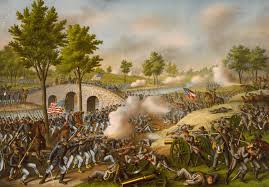
What was the most important battle of the American Civil War? Most people would say Gettysburg. Gettysburg is a popular choice because it was the war’s largest battle. Gettysburg was decisive but I would like to propose three other battles that I think made a dynamic difference in the War Between the States. These three are Antietam, Vicksburg and Atlanta.
Firstly, the battle of Antietam was important because it resulted in the issue of the Emancipation Proclamation which in turn resulted in diplomatic isolation of the Confederacy.
The battle occurred on September 17, 1862 near the town of Sharpsburg, Maryland. (The battle is commonly referred to as the Battle of Sharpsburg in the South.) The battle was between the Confederate Army of Northern Virginia under Robert E. Lee and the Union Army of the Potomac under George McClellan. Lee had invaded Maryland in early September. The battle at Antietam proved tactically inconclusive but Lee ended his campaign in Maryland. God’s providence was evident in the battle as the vastly inferior McClellan would most likely have been defeated at Antietam without the convenient discovery of Lee’s battle plans wrapped in a cigar. The battle of Antietam was the bloodiest single day in American history. (The bloodiest battle in American history is the battle of Gettysburg but this battle was fought over three days.) Besides this, the battle of Antietam was important because it was the victory necessary for Abraham Lincoln to issue the Emancipation Proclamation, the freeing of the slaves, without coming across desperate. The Union armies had been doing mediocre at best until this point of the war and Lincoln didn’t want to issue the Emancipation Proclamation as a desperate measure. The “victory” at Antietam gave him the perfect opportunity. As a result of the issuing of the Emancipation Proclamation Lincoln dissuaded abolitionist countries like France and Great Britain from diplomatically and militarily support the Confederacy, leaving the Confederates to fight the North on their own.
Secondly, the battle of Vicksburg was decisive because it resulted in the literal dissection, division and dismemberment of the Confederacy. The battle was not as much of a battle as it was actually a siege. Vicksburg was a key, strategic city in Mississippi along the Mississippi River. This siege set Ulysses S. Grant’s Army of the Tennessee with the Confederate defenders of Vicksburg under John C. Pemberton. After a series of failed direct attacks against the city, Grant settled down to starve the city to surrender. Eventually, Pemberton surrendered on July 4, 1863, the day after the end of the battle of Gettysburg in Pennsylvania. The capitulation of Vicksburg left the Mississippi River in the hands of the Union and divided the Confederacy into dismembered sections. It also left Mississippi the hands of the Union and enabled Grant to move into Middle Tennessee where he would drive the Confederates out of Chattanooga.
Finally, the battle of Atlanta put the nail in the coffin for the Confederacy. After having defeated General Braxton Bragg’s army in Tennessee the Union army under Grant split. Grant traveled north to match wits with Lee in Virginia and William T. Sherman invaded Georgia. After brilliant maneuvers which left Confederate Commander John Bell Hood in a vulnerable position, Sherman crushed the Southerners outside the city of Atlanta. Hood retreated into Tennessee where he would be defeated finally at Nashville and the city of Atlanta fell to Sherman on July 22, 1864. This victory came at a decisive time in the war. The presidential election of 1864 was soon approaching and despite Union successes in the Western Theater (Mississippi and Tennessee), many politicians wanted to negotiate an end to the war. This negotiation would most likely end in great benefits, perhaps independence, for the Confederacy. Even some Republicans in the government were beginning to agree with the Democrats that the war needed to end fast. The capture of Atlanta shifted popular opinion away from negotiation and towards total victory. This resulted in Lincoln’s reelection and the continuation of the war. The fall of Atlanta also enabled Sherman to embark on his tremendous, (in)famous “March to the Sea”, which left a path of destruction across Georgia’s countryside and ended in Sherman’s capture of Savannah on the coast.
These three battles were certainly not the only decisive battles in the Civil War. Notable mentions include Gettysburg (of course), Chattanooga, Chickamauga, First Manassas (Bull Run) and Perryville.
